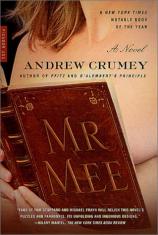Reading Group Guide
Discussion Questions
Mr. Mee

1. Identify the three separate narrative strands that run through Mr. Mee , describing the characters, settings, goals, and conflicts that comprise each strand. How do these three strands relate to one another? Also, in your judgement, has author Andrew Crumey successfully interwoven these strands? Explain why or why not.
2. First and foremost, this is a comic novel. Name and locate the various types of comedy-satire, farce, slapstick, parody, and so on-that appear in these pages. Which did you consider the most effective, and which the least? Defend your answers with references from the book.
3. What did you, as a reader, come to learn-over the course of this novel, in each of the three different narratives-about Jean-Bernard Rosier and his elusive Encyclopedia? Why do you suppose the character of Rosier is never encountered directly? What other such "ghosts" are important to the direction or design of this novel?
4. Of the main characters in this book--Mr. Mee, Ferrand, Minard, and Dr. Petrie-at least two of them are avid readers and one of them, Petrie, is an author. Explain Petrie's unorthodox notions, as culled from Proust and elsewhere, on the complex relation between autobiography and fiction. How do these ideas inform his doctoral thesis (and book) entitled Ferrand and Minard? And how do such ideas inform Mr. Mee more generally? Finally, consider Mr. Mee as a piece of writing that is itself about writing-both art and craft, impulse and creation, expression and communication, lie and truth.
5. In Chapter 11, the jovial and chubby 18th-century Parisian copyist known as Minard encounters another character who is known as Minard. How do you (as a reader) explain this occurrence? Where and why does this meeting happen? And how does this scene fit in with the novel's thematic blurring of literary, historical, and personal identities? Also, why do Ferrand and Minard keep insisting that "these are not [their] real names"? Discuss the difficult nature of selfhood as it is illustrated in Mr. Mee.
6. While trying to seduce his beloved Louisa, in Chapter 12, Dr. Petrie talks to the pretty young co-ed about his personal life (his wife, her job, their lack of children, etc.). In doing so, he is reminded of a similarity to the family life of Jean-Jacques Rousseau. Louisa's reply is brief but telling: "Yes. Back to Rousseau." Why does she mean by making this remark? Does it seem justified to you-or sarcastic, impatient, or the like? Fully explain your view in light of Dr. Petrie's behavior.
7. As a group, explore the novel's manifold philosophical aspects. The syllogisms of Aristotle, the paradoxes of Zeno, probability theory, and quantum physics are but a few of the actual philosophical concepts at least touched on in these pages. Explain these ideas, citing outside research as necessary, and point out where and why they surface in the novel. Can you identify other such "real" constructs? What about the make-believe theories and philosophies running throughout Mr. Mee ? What are these, and where do they show up?
8. One of the major themes in this book is the human mind's ongoing struggle between information and wisdom. Identify those phenomena in Mr. Mee (fictional, historical, technological, or otherwise) which might symbolize information, and those which might stand for wisdom. How is this struggle framed and presented within the novel? And how, if at all, is it resolved?
9. Several of the chapters in Mr. Mee are rendered as letters. As readers we can identify the authors of these letters, but rarely do we know who exactly is reading them. Where else is this awkward, lopsided, and mysterious relationship discernible in the novel? Also, discuss this book's properties as a literary labyrinth or textual jigsaw puzzle. Compare it with any other works you have encountered in this genre (such as those by Eco, Kundera, Stoppard, Borges, and so on).
10. Describe the Epilogue of Mr. Mee . Who is narrating this passage, and when and where does it take place? How is each of the novel's three narratives changed and/or concluded by this ending? And how does the "Theatrophone" device described in the Epilogue relate to the novel's imformation-versus-wisdom theme (especially as discussed earlier, in question #5)?
Mr. Mee
- Publication Date: March 6, 2002
- Paperback: 352 pages
- Publisher: Picador
- ISBN-10: 0312282354
- ISBN-13: 9780312282356






